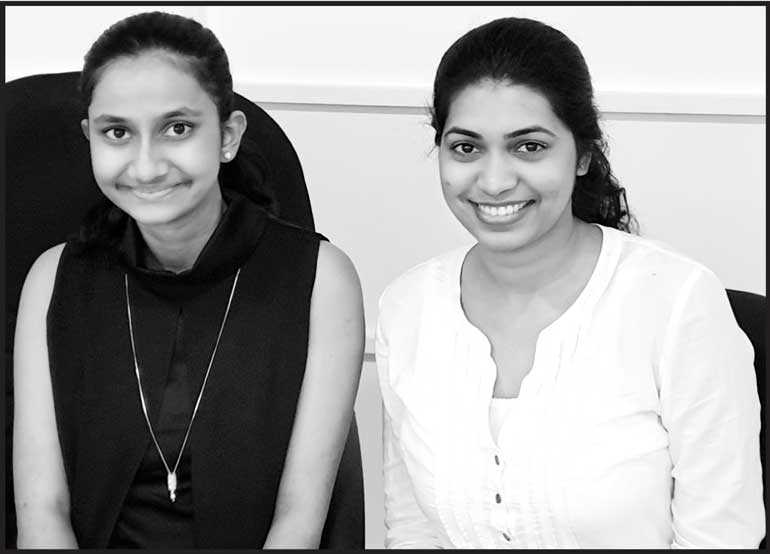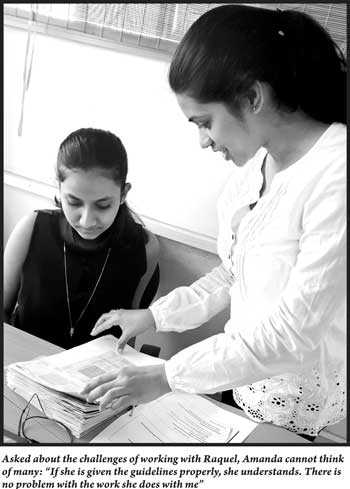Friday Feb 20, 2026
Friday Feb 20, 2026
Saturday, 7 September 2019 00:05 - - {{hitsCtrl.values.hits}}

Raquel and Amanda. As examples such as Raquel’s show, change is possible and can bring many benefits for autistic people, companies, and society
 “She catches on very quickly,” Amanda de Moore explains. “I have to teach her only once, then she gets it and does it properly.” Amanda is talking about Raquel, a young autistic intern at her office.
“She catches on very quickly,” Amanda de Moore explains. “I have to teach her only once, then she gets it and does it properly.” Amanda is talking about Raquel, a young autistic intern at her office.
Raquel works five days a week with around two dozen colleagues at a not-for-profit organisation. She interns half-day at a salon on Tuesdays and Thursdays, otherwise she is at her desk from morning to afternoon. She prints and photocopies, prepares workshops and organises files; she types texts, works with excel, and researches articles online.
Asked about the challenges of working with her, Amanda cannot think of many: “If she is given the guidelines properly, she understands. There is no problem with the work she does with me.”
In Sri Lanka, this is still a rare exception. Statistics suggest several hundred thousand people with autism spectrum disorder (ASD) in the country, but few of them have a job. After childhood, Sri Lanka lacks institutions and opportunities for those on the spectrum. The first dedicated vocational training centre for children and youth with autism opened only this year in Pilimathalawa, Kandy, and suitable employment options are extremely limited.
However, this need not be the case. As examples such as Raquel’s show, change is possible and can bring many benefits for autistic people, companies, and society.
ASD and the workplace
The primary job market poses many challenges to people with ASD. Fields which revolve around social interaction are often difficult, office environments with ringing phones, flickering lights and commotion can overwhelm with sensory input. Many autistic people dislike changes and have ingrained routines, they struggle with communication and etiquette. Job interviews can seem an insurmountable challenge in themselves, a crowded lunchroom might not provide space for an actual break.
In Raquel’s case, she places great importance on punctuality and can get overwhelmed if data comes in unfamiliar formats. “If she is given a time, and someone isn’t there at this time, she gets a bit worried,” says Amanda de Moore. “She gets disturbed if her pickup is late.”
On the other hand, autistic people often excel at certain tasks. They tend to be good at pattern recognition, attention to detail, spotting errors or mistakes, and working with numbers. They are usually very honest and like routine work they can improve with every iteration. Working in a company gives people with ASD space to grow and lead a fulfilling life, it increases their confidence and their independence.
Why employ someone with autism?
 As dramatised in movies like ‘Rain Man,’ some autistic people are exceptionally talented in one narrow area. They can be genius-level mathematicians or musical savants, special Olympians, singers, or best-selling novelists. Famous actors like Dan Aykroyd or Sir Anthony Hopkins have been diagnosed with Asperger syndrome, and many historic personalities might have been autistic: Einstein, Newton, Darwin, Mozart, Michelangelo.
As dramatised in movies like ‘Rain Man,’ some autistic people are exceptionally talented in one narrow area. They can be genius-level mathematicians or musical savants, special Olympians, singers, or best-selling novelists. Famous actors like Dan Aykroyd or Sir Anthony Hopkins have been diagnosed with Asperger syndrome, and many historic personalities might have been autistic: Einstein, Newton, Darwin, Mozart, Michelangelo.
But these are exceptions, not the rule: most autistic people fall into the same range as everyone else with their own strengths and weaknesses. However, in no way does this make them unemployable: No company runs on a workforce of geniuses. There is a lot that autistic people can bring to the table: they often pay great attention to detail, are thorough, observant, reliable, and honest. Amanda agrees: “Raquel is very methodical and does the exact thing you tell her.”
The characteristics of ASD are assets in fields such as IT and programming, quality assurance, proofreading and product testing, service and support, research, archives or libraries. As proven by many non-profit organisations and companies around the world, it is perfectly feasible to hire autistic employees: and more than that, it lifts up everyone involved.
Corporations are catching on to the benefits of inclusivity. Microsoft runs an Autism Hiring Program since 2015, including an “interview academy;” the same goes for HP or New Relic, Home Depot, Ford, or Vodafone. German IT giant SAP has pledged to hire 1% autistic people till 2020—a significant number considering the size of their total workforce across 180 countries.
Europe and North America have no monopoly on this. SAP started hiring autistic software developers in 2011 in Bangalore and discovered that it increased their productivity. JP Morgan India launched an ‘Autism at Work’ initiative in 2016, Dell EMC Asia-Pacific has started a drive to hire people with ASD in India, Singapore, and Malaysia. Specialisterne, a company founded in Denmark to hire people with ASD and use their characteristics as a competitive advantage, has expanded to twelve other countries including Singapore and Australia.
As one of SAP’s autistic employees states: “We’re a good return on investment.”
How to employ autistic people
Without local role models, employing people with ASD can seem like a daunting task in Sri Lanka. One part of the challenge is the work environment for autists—the other part is acceptance and integration with the rest of the workforce. Large multinational corporations can dedicate vast resources to screening and support: SAP, for example, forgoes the interview process in favour of a month-long screening and workshop process. But what about smaller companies?
Many measures are easy to implement and only require awareness. It starts with a company’s online presence, continues through job interviews, and goes on to the actual work environment. Companies can state that they are open to applicants with ASD, they can offer internships or create part-time positions. For job interviews, they can send the agenda in advance to help applicants.
Companies can prepare their other employees with a sensitivity training on what to expect. Their autistic colleagues might avoid eye contact or not want to spend their break in the lunchroom with them; they might sometimes say inappropriate things out loud, make noises, do not understand irony and sarcasm, or be more honest than socially acceptable.
If possible, having a job coach to act as a translator between autistic employees, other employees, and company management can be invaluable. Bigger enterprises can have a dedicated post for this, smaller companies could collaborate with non-profit partners or excuse an employee for a few hours per week for this purpose.
For the workplace itself, it is important to think of support, not separation. It is about allowing autistic people to use their strengths and minimise their difficulties while integrating into and not disrupting the company’s general workflow. A calm, structured, sensory-friendly environment goes a long way, as do a clear daily schedule, straightforward instructions, and well-planned processes.
Taking a chance
Government regulations and the public sector change slowly: private companies are free to act immediately and create positions and perspectives for people with autism. It allows autistic people to be their own advocates and create a deep, lasting awareness. It is one thing to listen to a lecture or watch a video about autism: it’s another to work with an autistic person and meet them every day.
If people on the autism spectrum can find jobs, it will relieve stress for their families and social support systems. It allows them to take part in and contribute to society, to be part of a positive change and integrate themselves. Personal growth goes hand in hand with economic growth and hiring those on the autism spectrum offers great advantages for both sides.